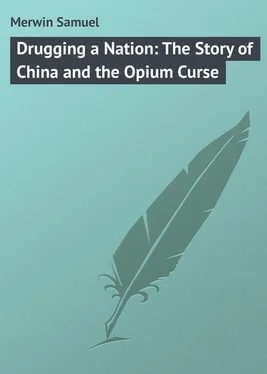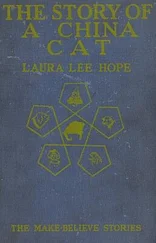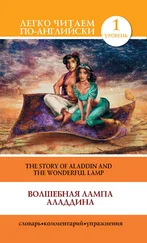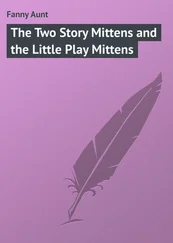Samuel Merwin - Drugging a Nation - The Story of China and the Opium Curse
Здесь есть возможность читать онлайн «Samuel Merwin - Drugging a Nation - The Story of China and the Opium Curse» — ознакомительный отрывок электронной книги совершенно бесплатно, а после прочтения отрывка купить полную версию. В некоторых случаях можно слушать аудио, скачать через торрент в формате fb2 и присутствует краткое содержание. Жанр: foreign_prose, на английском языке. Описание произведения, (предисловие) а так же отзывы посетителей доступны на портале библиотеки ЛибКат.
- Название:Drugging a Nation: The Story of China and the Opium Curse
- Автор:
- Жанр:
- Год:неизвестен
- ISBN:нет данных
- Рейтинг книги:5 / 5. Голосов: 1
-
Избранное:Добавить в избранное
- Отзывы:
-
Ваша оценка:
- 100
- 1
- 2
- 3
- 4
- 5
Drugging a Nation: The Story of China and the Opium Curse: краткое содержание, описание и аннотация
Предлагаем к чтению аннотацию, описание, краткое содержание или предисловие (зависит от того, что написал сам автор книги «Drugging a Nation: The Story of China and the Opium Curse»). Если вы не нашли необходимую информацию о книге — напишите в комментариях, мы постараемся отыскать её.
Drugging a Nation: The Story of China and the Opium Curse — читать онлайн ознакомительный отрывок
Ниже представлен текст книги, разбитый по страницам. Система сохранения места последней прочитанной страницы, позволяет с удобством читать онлайн бесплатно книгу «Drugging a Nation: The Story of China and the Opium Curse», без необходимости каждый раз заново искать на чём Вы остановились. Поставьте закладку, и сможете в любой момент перейти на страницу, на которой закончили чтение.
Интервал:
Закладка:
There is nothing new in this charge, nothing new in the condition which invites it. It is rather a commonplace old condition. Millions of men, for more than a hundred years, have taken it for granted, just as men once took piracy for granted, just as men once took the African slave-trade for granted, just as men to-day take the highly organized traffic in unfortunate women and girls for granted. Ask a Tory political leader of to-day – Mr. Balfour say – for his opinion on the opium question, and if he thinks it worth his while to answer you at all he will probably deal shortly with you for dragging up an absurd bit of fanaticism. For a century or more, about all the missionaries, and goodness knows how many other observers, have protested against this monstrous traffic in poison. Sixty-five years ago Lord Ashley (afterwards Earl of Shaftesbury) agitated the question in Parliament. Fifty years ago he obtained from the Law Officers of the Crown the opinion that the opium trade was “at variance” with the “spirit and intention” of the treaty between England and China. In 1891, the House of Commons decided by a good majority that “the system by which the Indian opium revenue is raised is morally indefensible.” And yet, I will venture to believe that to most of my readers, British as well as American, the bald statement that the British Indian government actually manufactures opium on a huge scale in its own factories to suit the Chinese taste comes with the force of a shock. It is not the sort of a thing we like to think of as among the activities of an Anglo-Saxon government. It would seem to be government ownership with a vengeance.
Now, to get down to cases, just what this Government Opium Monopoly is, and just how does it work? An excerpt from the rather ponderous blue book will tell us. It may be dry, but it is official and unassailable. It is also short.
“The opium revenue” – thus the blue book – “is partly raised by a monopoly of the production of the drug in Bengal and the United Provinces, and partly by the levy of a duty on all opium imported from native states… In these two provinces, the crop is grown under the control of a government department, which arranges the total area which is to be placed under the crop, with a view to the amount of opium required.”
So much for the broader outline. Now for a few of the details:
“The cultivator of opium in these monopoly districts receives a license, and is granted advances to enable him to prepare the land for the crop, and he is required to deliver the whole of the product at a fixed price to opium agents, by whom it is dispatched to the government factories at Patna and Ghazipur.”
This money advanced to the cultivator bears no interest. The British Indian government lends money without interest in no other cases. Producers of crops other than opium are obliged to get along without free money.
When it has been manufactured, the opium must be disposed of in one way and another; accordingly:
“The supply of prepared opium required for consumption in India is made over to the Excise Department… The chests of ‘provision’ opium, for export, are sold by auction at monthly sales, which take place at Calcutta.” For the meaning of the curious term, “provision opium,” we have only to read on a little further. “The opium is received and prepared at the government factories, where the out-turn for the year included 8,774 chests of opium for the Excise Department, about 300 pounds of various opium alkaloids, thirty maunds of medical opium, and 51,770 chests of provision opium for the Chinese market.” There are about 140 pounds in a chest. Four grains of opium, administered in one dose to a person unaccustomed to its use, is apt to prove fatal.
Last year the government had under poppy cultivation 654,928 acres. And the revenue to the treasury, including returns from auction sales, duties, and license fees, and deducting all “opium expenditures,” was nearly $22,000,000 (£4,486,562).
The best grade of opium-poppy bears a white blossom. One sees mauve and pink tints in a field, at blossom-time, but only the seeds from the white flowers are replanted. The opium of commerce is made from the gum obtained by gashing the green seed pod with a four-bladed knife. After the first gathering, the pod is gashed a second time, and the gum that exudes makes an inferior quality of opium. The raw opium from the country districts is sent down to the government factories in earthenware jars, worked up in mixing vats, and made into balls about six or eight inches in diameter. The balls, after a thorough drying on wooden racks, are packed in chests and sent down to the auction.
The men who buy in the opium at these monthly auctions and afterwards dispose of it at the Chinese ports are a curious crowd of Parsees, Mohammedans, Hindoos, and Asiatic Jews. Few British names appear in the opium trade to-day. British dignity prefers not to stoop beneath the taking in of profits; it leaves the details of a dirty business to dirty hands. This is as it has been from the first. The directors of the East India Company, years and years before that splendid corporation relinquished the actual government of India, forbade the sending of its specially-prepared opium direct to China, and advised a trading station on the coast whence the drug might find its way, “without the company being exposed to the disgrace of being engaged in an illicit commerce.”
So clean hands and dirty hands went into partnership. They are in partnership still, save that the most nearly Christian of governments has officially succeeded the company as party of the first part. And sixty-five tons of Indian opium go to China every week.
As soon as the shipments of opium have reached Hongkong and Shanghai (I am quoting now in part from a straightforward account by the Rev. T. G. Selby), they are broken up and pass in the ordinary courses of trade into the hands of retail dealers. The opium balls are stripped of the dried leaves in which they have been packed, torn like paste dumplings into fragments, put into an iron pan filled with water and boiled over a slow fire. Various kinds of opium are mixed with each other, and some shops acquire a reputation for their ingenious and tasteful blends. After the opium has been boiled to about the consistency of coal tar or molasses, it is put into jars and sold for daily consumption in quantities ranging from the fiftieth part of an ounce to four or five ounces. “I am sorry to say,” observes Mr. Selby, “that the colonial governments of Hongkong and Singapore, not content with the revenue drawn from this article by the Anglo-Indian government, have made opium boiling a monopoly of the Crown, and a large slice of the revenue of these two Eastern dependencies is secured by selling the exclusive rights to farm this industry to the highest bidder.”
The most Mr. Clean Hands has been able to say for himself is that, “Opium is a fiscal, not a moral question;” or this, that “In the present state of the revenue of India, it does not appear advisable to abandon so important a source of revenue.” After all, China is a long way off. So much for Mr. Clean Hands! His partner, Dirty Hands, is more interesting. It is he who has “built up the trade.” It is he who has carried on the smuggling and the bribing and knifing and shooting and all-round, strong-arm work which has made the trade what it is. To be sure, as we get on in this narrative we shall not always find the distinction between Clean and Dirty so clear as we would like. Through the dust and smoke and red flame of all that dirty business along “the Coast” we shall glimpse for an instant or so, now and then, a face that looks distressingly like the face of old Respectability himself. I have found myself in momentary bewilderment when walking through the splendid masonry-lined streets of Hongkong, when sitting beneath the frescoed ceiling of that pinnacled structure that houses the most nearly Christian of parliaments, trying to believe that this opium drama can be real. And I have wondered, and puzzled, until a smell like the smell of China has come floating to the nostrils of memory; until a picture of want and disease and misery – of crawling, swarming human misery unlike anything which the untravelled Western mind can conceive – has appeared before the eyes of memory. I have thought of those starving thousands from the famine districts creeping into Chinkiang to die, of those gaunt, seemed faces along the highroad that runs southwestward from Peking to Sian-fu; I have thought of a land that knows no dentistry, no surgery, no hygiene, no scientific medicine, no sanitation; of a land where the smallpox is a lesser menace beside the leprosy, plague, tuberculosis, that rage simply at will, and beside famines so colossal in their sweep, that the overtaxed Western mind simply refuses to comprehend them. And De Quincey’s words have come to me: “What was it that drove me into the habitual use of opium? Misery – blank desolation – settled and abiding darkness – ?” These words help to clear it up. China was a wonderful field, ready prepared for the ravages of opium – none better. The mighty currents of trade did the rest. The balance sheet reigned supreme as by right. The balance sheet reigns to-day.
Читать дальшеИнтервал:
Закладка:
Похожие книги на «Drugging a Nation: The Story of China and the Opium Curse»
Представляем Вашему вниманию похожие книги на «Drugging a Nation: The Story of China and the Opium Curse» списком для выбора. Мы отобрали схожую по названию и смыслу литературу в надежде предоставить читателям больше вариантов отыскать новые, интересные, ещё непрочитанные произведения.
Обсуждение, отзывы о книге «Drugging a Nation: The Story of China and the Opium Curse» и просто собственные мнения читателей. Оставьте ваши комментарии, напишите, что Вы думаете о произведении, его смысле или главных героях. Укажите что конкретно понравилось, а что нет, и почему Вы так считаете.












